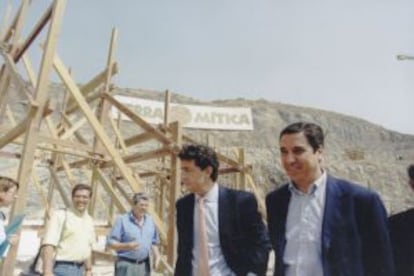Terra Mítica: a forgotten fiasco
The investigation into the theme park, the first major corruption inquiry in Valencia, draws to a close


The year is 1997. The place is Benidorm. Eduardo Zaplana, a former minister in the Popular Party (PP) administration of José María Aznar, is the regional premier of the Valencia region. Two years before that, he had been mayor of Benidorm, the popular tourist resort whose profusion of skyscrapers has earned it the nickname “Beniyork.”
The Valencia regional government had just invested heavily in a theme park called Terra Mítica, which Zaplana praised with triumphant rhetoric. “This park will be a source of pride for the Valencia region and for a society that had been insistently demanding it. This is something that we are going to be particularly satisfied and happy about,” he proclaimed back then.
But 17 years later, a very different story emerges – one involving hundreds of millions of euros in losses for the Valencia government and many regional lenders, which have since disappeared. Terra Mítica also stands for real estate speculation and corruption.
As a place destined to become “the most important theme park in Europe” faltered and defaulted on payments, Terra Mítica became known chiefly for the court case that built around it in 2005 and is now entering its final stretch.
The investigation involved tax fraud worth millions, document forgery, money laundering and other crimes. It was the first major corruption case in the Valencia region. Yet eventually, it also dropped out of the public spotlight.
Investigating judge Francisco Silla charged 38 people, including park executives, businesspeople and alleged front men. The attorney wants long prison terms for them – of over 50 years in some cases.
Two businessmen who will stand trial, José Herrero and Antonio Moreno Carpio, admitted to two Socialist deputies that they participated in a complex web of fake invoices and that part of the money was channeled to Zaplana, who had appointed his brother-in-law to the position of director of hirings at the park. The deputies recorded the conversations, but the businessmen retracted and their earlier statements were not admitted as evidence in court. Zaplana could breathe easy. His brother-in-law faces a 10-year prison term, however.
Everything about Terra Mítica was big. The rides found inspiration in ancient civilizations, the parking lots were huge and even the roundabouts had lofty names such as “Reason.”
Regional authorites claimed the park would attract two million visitors a year. But it has been less than half that, year after year
No expense was spared when it came to gardens and landscaping, either. Until 1992, there was a pine forest here, but it went up in flames. Investigators said it was arson, and the regional government, then in the hands of the Socialist Party, investigated whether there was any link to real estate interests.
Six years later, the same government, then ruled by the PP, expropriated the land to make way for the theme park.
Nearly everyone who got involved with Terra Mítica has lost money. The park cost around €400 million to build, and most of the funds came from the public coffers. In 2012, it was sold for €65 million.
The only people who made money from the project were those who owned land near the park site, or those who quickly bought some before the Valencia government announced its final location (for months, there were three options on the table). On April 18, 1997 the land around the park site was selling for €6 a square meter. By May 10, after the announcement, the going price was three times that.

The flowers, plants and trees that provide such a stark contrast with the arid terrain outside the premises are apparently the result of significant criminal activity at Terra Mítica, according to the investigation.
A network of entrepreneurs, working in collusion with park managers, billed Terra Mítica almost €6 million for work that was never carried out or wildly exaggerated. Tax authorities believe there are around 20 companies involved in a €4.4 million fraud that withheld VAT and corporate tax.
The strategy was very similar to one used by Ángel Fenoll, a businessman from Alicante who has just received a 35-year sentence for tax fraud through his garbage collection service.
Meanwhile, the park has changed hands repeatedly, and is now owned by the Aqualandia Group, but it has never lived up to expectations. And its bad reputation only got worse after the recent accident in which a young man from Iceland died when he fell out of a rollercoaster. The safety belt and bar had malfunctioned, it appeared.
Regional authorites claimed the park would attract two million visitors a year. But it has been less than half that, year after year.
A 1997 report by a specialized consulting agency, Economics Research Associates, warned that “the potential to reach the necessary attendance levels to make this a viable project is not there in Benidorm. In our opinion, a theme park is a high-risk strategy in terms of requiring enormous, nonrecoverable amounts of public investment.” But the Valencian government didn’t listen.







































